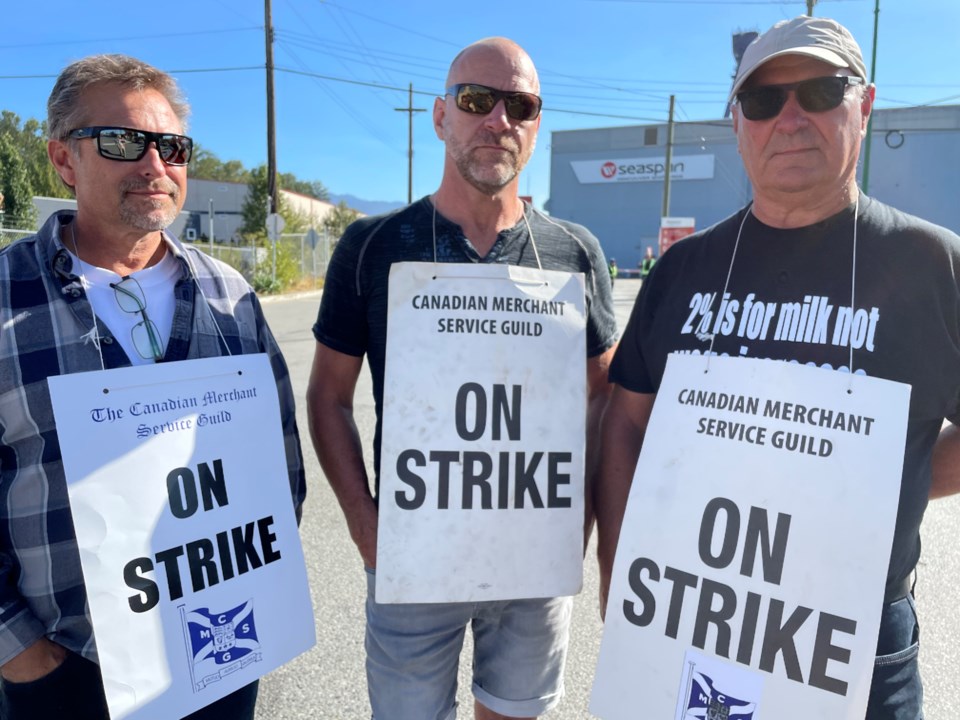Work building massive joint support ships for the federal government has halted this week at Seaspan’s Vancouver Shipyards as about 1,000 unionized trades workers refused to cross picket lines set up by striking tugboat captains.
More than 1,000 people, including welders, pipefitters, electricians and a host of other trades, are usually at work at the North Vancouver shipyards, where construction on two massive Navy joint support ships and an offshore science vessel for the Coast Guard are underway.
Workers off the job since Friday
But those workers have refused to cross picket lines since Friday.
Pickets are also up at Vancouver Drydock, another division of Seaspan based in North Vancouver.
The labour dispute at the huge marine company began last month, when unionized tugboat captains walked off the job on Seaspan tugs over a contract bargaining dispute with the company.
The Canadian Merchant Service Guild represents ships’ captains and engineers who work on tugboats that provide assistance to ships docking in the port as well as on barges throughout the south coast. Their contract expired in 2019.
The union posted a notice on its website Aug. 25 announcing contract negotiations with Seaspan’s marine transport division had reached an impasse and a strike was beginning at noon that day.
Other unionized workers at the shipyard joined the striking tugboat captains on the picket lines to show their support this week.
On Thursday, striking workers walked a picket line outside of Seaspan’s main entrance at McKeen Avenue in North Vancouver.
Neither the Canadian Merchant Service Guild representing the striking tugboat crews or Seaspan has commented on what the sticking points are in the dispute.
But workers at the picket line indicated the contract dispute is mainly over wage increases.
Picketers declined to discuss specifics of the contract dispute, but said they were asking for a contract that was equal to “industry standards” with a cost-of-living adjustment. Several strikers wore a T-shirts reading “2 % is for milk not wage increases.”
Toby Charette, president of the Marine and Shipbuilders Union, whose members are refusing to cross the picket line, was outside Seaspan with the striking workers on Thursday. Charette said the strike has been brought about because “the guild was offered an embarassing offer for their contract” which expired three years ago.
“As union brothers, we cannot cross this picket line, we will not cross a picket line, ever. So we’re standing out here waiting for Seaspan, to come to terms and bargain in good faith with the guild. And give them what they deserve. Very plain and simple,” said Charette.
Seaspan tugboat crews on strike
Seaspan is one of the largest tug and barge operators on the coast, providing help in ship docking, oil tanker escort and emergency towing. It operates 30 tugboats and is one of the largest tugboat operators in the Port of Vancouver.
A Labour Relations Board decision issued Sept. 1 allowed striking tugboat workers from the marine division to set up picket lines preventing shipyard workers from reporting to work. Since then, “virtually no union employees have reported to work at Vancouver Shipyards,” said Seaspan spokesperson Ali Hounsell.
The company plans to challenge the labour board ruling, she added.
If the work stoppage continues for any length of time, it could spell further delays for the federal shipbuilding program at Seaspan, which has already been plagued with setbacks.
At the end of June, Ottawa announced that the expected delivery date for both joint support ships has been pushed back by two years – the latest of several such timeline revisions. The first ship is now expected to be delivered in 2025, while the second ship won’t be finished until 2027.
Strike impacts freighters, cruise ships in port
The tugboat strike has also caused some delays to movements of freighters and cruise ships in the Port of Vancouver.
At the between Aug. 28 - 31, five cruise ships and three bulk freighters in the port were prevented from leaving or arriving at port on time or getting bunker fuel when expected, according to the Port of Vancouver.
At one point, around 2,500 passengers on board the Celebrity Eclipse, which was delayed leaving the port, vented their displeasure at the delay on social media, saying they were being held ‘hostage’ on the ship.
The issue was eventually resolved.
"Labour action is now limited to Seaspan facilities and equipment. Port operations are currently fluid and all marine cargo terminals and cruise ship facilities are operational; other providers are providing tug and barge services at the port," according to a statement from the port on Friday.
About 14 ships a day require escort and berthing help from tugboats in the Port of Vancouver, and Seaspan is normally one of four tug-assist providers and one of two bunker suppliers in the port.




